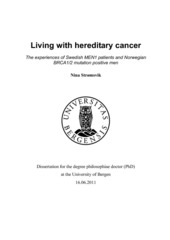| dc.contributor.author | Strømsvik, Nina | en_US |
| dc.date.accessioned | 2011-06-10T12:45:05Z | |
| dc.date.available | 2011-06-10T12:45:05Z | |
| dc.date.issued | 2011-06-16 | eng |
| dc.identifier.isbn | 978-82-308-1776-6 (print version) | en_US |
| dc.identifier.uri | https://hdl.handle.net/1956/4799 | |
| dc.description.abstract | Background: During the past two decades there has been an increasingly focus on cancer risk reduction using genetic tests and family history to identify persons with increased risk of developing cancer. Depending on the genetic condition, persons at significantly increased risk may be identified and then enrolled into long term surveillance programs. This is the case for patients with Multiple Endocrine Neoplasia type 1(MEN1) where nearly 100% develop symptoms. Others may be identified as having a slightly increased cancer risk, but no management strategies are made available for them. This is the current clinical practice for Norwegian men identified with a mutation in breast cancer gene 1(BRCA1) or breast cancer gene 2 (BRCA2). Limited research interest has been paid to researching the psychosocial issues of these patient groups, the MEN1 patients and men with BRCA1/2 mutations. Aims: The overall aim of this thesis is to explore and describe the experiences of two patient groups living with high and slightly increased risk for hereditary cancer. Material and methods: Qualitative semi-structured interviews had been performed with 29 MEN1 patients recruited through a specialty clinic in Sweden (Study 1). The data were analyzed in line with Georgi’s phenomenological method. To learn about male experiences in hereditary breast and ovarian cancer syndrome (HBOC) families, a systematic review of existing psychosocial research on this topic was performed, and a thematic analysis was utilized (Study 2). Further, 15 BRCA1/2 mutation positive men participated in two successive in-depth interviews, and seven female partners participated in the second interview (Study 3). These participants were recruited through two departments of Clinical Genetics in Norway. A phenomenological lifeworld approach was utilized, and the in-depth interviews were analyzed using Georgi’s phenomenological method. Results: The MEN1 patients with high increased risk described mixed feelings about the clinical follow-up program. They experienced decent care from their health care providers but they still had unmet informational needs. Their genetic condition was associated with pain, job insecurity and feelings of guilt towards their children. They also experienced short-term perspective in future planning due to fears that their condition might worsen. However, they had adjusted to their situation and described a change in their priorities and values. They also defined themselves as healthy. A review of the literature regarding men in hereditary breast and ovarian cancer (HBOC) families describes women as playing the leading role in communicating genetic information in the family. Men`s decision to seek genetic counseling and testing is said to be out of family duty or as an obligation to their children. Men are described as suffering from intrusive feelings due to unresolved grief and to use avoidance as a coping strategy. Previous reports describe men’s feelings of guilt towards their children and other family members. Men`s genetic test results may have an impact on familial relationships and reproductive decisions. The Norwegian men identified as BRCA1/2 mutation positive experienced strong emotional reactions after disclosure of their test results including fear of developing cancer. The men also felt responsible for other family members’ health, and described an unmet need of risk information regarding their own and relatives’ potential cancer risk. Due to fear of being stigmatized most participants felt it important to keep the genetic information private. Many had not informed their children about the family mutation mainly because of their young age, or because they knew that their offspring were struggling with difficult life events. Participants also considered it difficult to discuss their test results or health related information with other males, and they perceived females as their social and emotional support. Conclusion: People’s feelings and understanding of genetic risk does not seem to depend on the numeric risk estimate. The results from this study pinpoint the need for counseling and follow-up strategies for both MEN1 patients and for male BRCA1/2 mutation carriers. Health care providers may have an impact on how these patients deal with their condition, and the patients may also profit from closer contact with community health care. There is also a need for future research regarding the psychosocial issues for MEN1 patients and BRCA1/2 mutation positive men. | en_US |
| dc.language.iso | eng | eng |
| dc.publisher | The University of Bergen | eng |
| dc.relation.haspart | Paper I: Journal of Genetic Counseling 16(1), Strømsvik, N.; Nordin, K.; Berglund, G.; Engebretsen, L. F.; Hansson, M. G.; Gjengedal, E., Living with Multiple Endocrine Neoplasia Type 1: Decent Care-Insufficient Medical and Genetic Information. A Qualitative Study of MEN1 Patients in a Swedish Hospital, pp. 105-117. Copyright 2007 National Society of Genetic Counselors. Published by Springer. Full text not available in BORA due to publisher restrictions. The published version is available at: <a href="http://dx.doi.org/10.1007/s10897-006-9047-2" target="_blank"> http://dx.doi.org/10.1007/s10897-006-9047-2</a> | en_US |
| dc.relation.haspart | Paper II: Familial Cancer 8(3), Strømsvik, N.; Råheim, M.; Øyen, N.; Gjengedal, E., Men in the women’s world of hereditary breast and ovarian cancer—a systematic review, pp. 221-229. Copyright 2009 Springer. Full text not available in BORA due to publisher restrictions. The published version is available at: <a href="http://dx.doi.org/10.1007/s10689-009-9232-1" target="_blank"> http://dx.doi.org/10.1007/s10689-009-9232-1</a> | en_US |
| dc.relation.haspart | Paper III: Journal of Genetic Counseling 19(4), Strømsvik, N.; Råheim, M.; Øyen, N.; Engebretsen, L. F.; Gjengedal, E., Stigmatization and male identity: Norwegian males’ experience after identification as BRCA1/2 mutation carriers, pp 360-370. Copyright 2010 National Society of Genetic Counselors. Published by Springer. Full text not available in BORA due to publisher restrictions. The published version is available at: <a href="http://dx.doi.org/10.1007/s10897-010-9293-1" target="_blank"> http://dx.doi.org/10.1007/s10897-010-9293-1</a> | en_US |
| dc.relation.haspart | Paper IV: Familial Cancer 10(3), Strømsvik, N.; Råheim, M.; Gjengedal, E., Cancer worry among Norwegian male BRCA1/2 mutation carriers, pp. 597-603. Full-text available in BORA: <a href="http://hdl.handle.net/1956/5054" target="_blank">http://hdl.handle.net/1956/5054</a> | en_US |
| dc.title | Living with hereditary cancer. The experiences of Swedish MEN1 patients and Norwegian BRCA1/2 mutation positive men | en_US |
| dc.type | Doctoral thesis | |
| dc.rights.holder | Copyright the author. All rights reserved | |
| dc.rights.holder | The author | |
| dc.subject.nsi | VDP::Medical disciplines: 700::Health sciences: 800::Nursing science: 808 | eng |
| dc.subject.nsi | VDP::Medical disciplines: 700::Clinical medical disciplines: 750::Oncology: 762 | eng |

